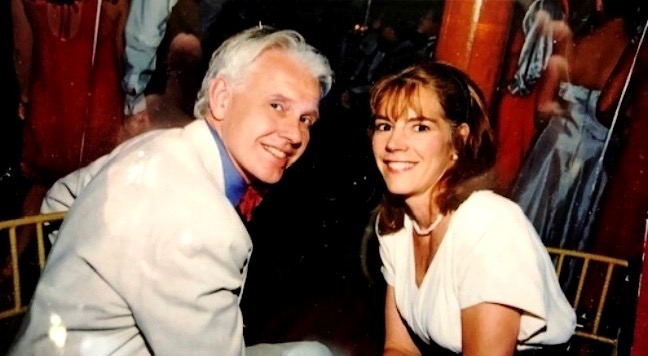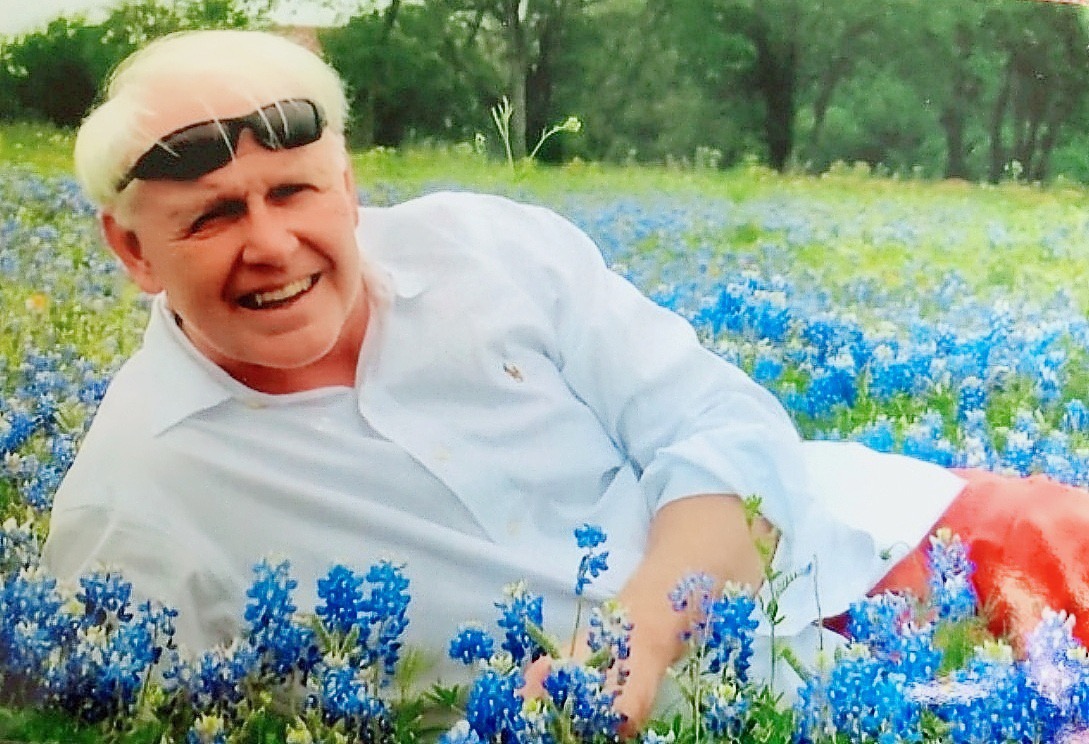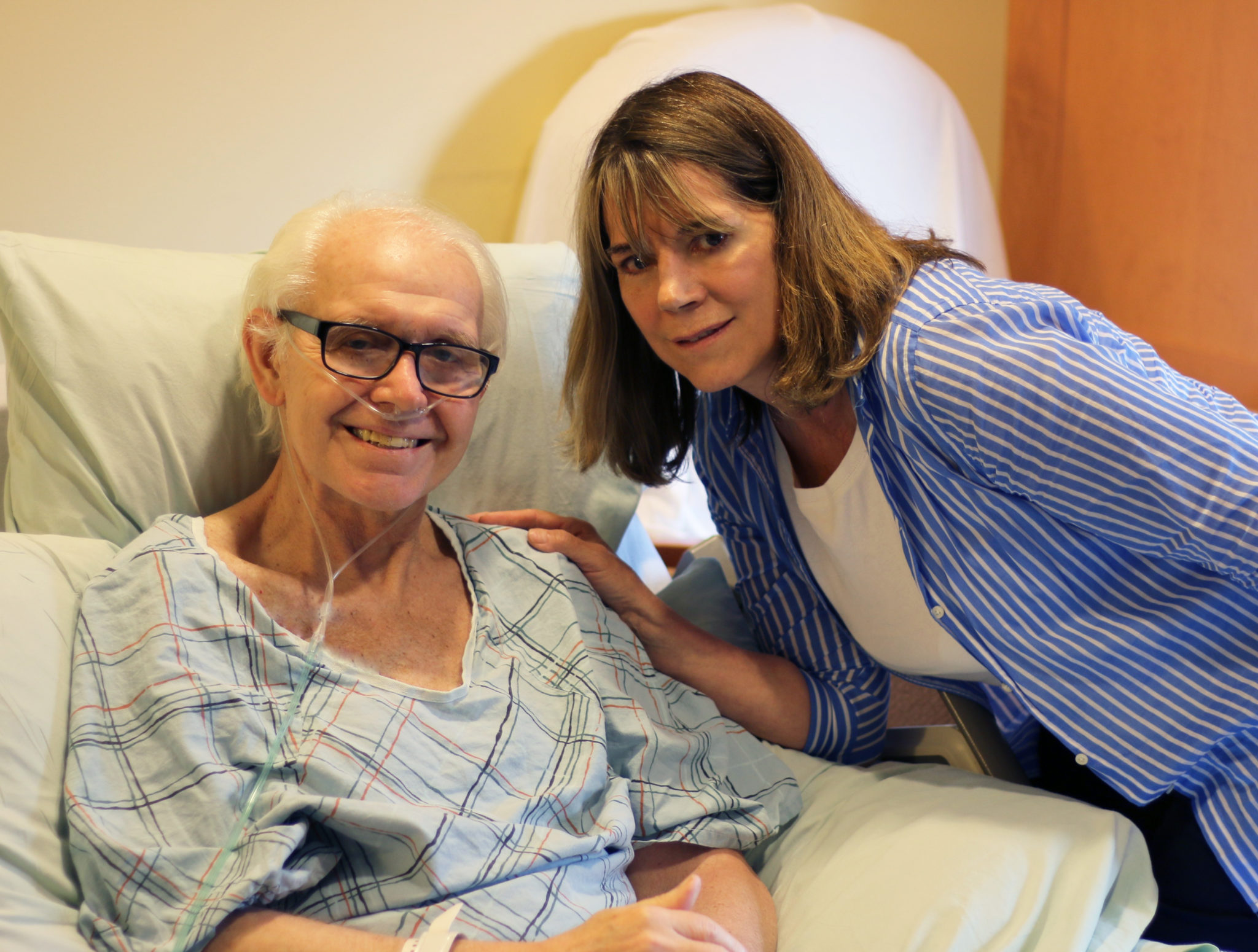John Martin looks adoringly at his wife Sheila from his hospice bed at the HopeHealth Hulitar Hospice Center. He’s stoic and it’s clear that his natural poise and direct, yet gentle demeanor served him well in his many years as an education administrator for independent schools throughout New England. Sheila and John share an unspoken language of love that is palpable when their eyes meet and in the natural cadence of their conversation.
Their deep connection was instrumental in John’s choice to advocate for hospice services when treatments were no longer working. In 2017, John was diagnosed with mesothelioma, a rare and aggressive type of cancer that develops in the linings of the lungs, abdomen or heart. While treatment can improve life expectancy and quality of life, most patients are given less than two years to live.
John endured several rounds of aggressive treatments, countless tests, high points, low points, clinical-trials, and numerous hospital stays. Eventually John and Sheila accepted that there were no more curative options to pursue and true to their plan, John transitioned to hospice services. John’s symptoms required more specialized care than his hospice team could manage in his home so he was transferred to the HopeHealth Hulitar Hospice Center.
John made one thing clear, “I want to go out teaching.”
A Hospice Experience Close to Home
Sheila, who was his primary caregiver at home prior to hospice, found she also had a renewed sense of comfort with their hospice experience. “I’m not worried 24/7 because I know he’s receiving such good care. It’s comforting and a relief,” she shared. “Everyone is so respectful, and quiet when they come in, which is nice. It feels like home.”
“I wanted to give my wife a break. I wanted her to be my wife and not my nurse. It was something we both agreed upon,” John explained.
When asked to describe himself, John chooses the words spiritual, intense, physical and romantic. Sheila suggests that he include optimistic and he obliges, smiling at Sheila, “I’ve had a blessed and wonderful life.”
After 34 years of marriage, John and Sheila enjoyed their last month together, visiting with friends at the HopeHealth Hulitar Hospice Center before John died on the morning of July 11, 2019.

John didn’t allow his diagnosis to stop him from teaching. He knew that his story could benefit others. He kept a blog about his illness and ensured his clinical tests and samples contributed to mesothelioma research. Understanding that he was at the end of his life, John made one thing clear, “I want to go out teaching.”
These are some of the profound thoughts and observations that John shared about his hospice experience, coming to terms with death, and the unexpected self-discoveries along the way.
“I think it’s really important to have dignity when you die.”
The Waiting Game Can Be Difficult
Two physicians must agree and certify that that a patient’s life expectancy is six months or less before the individual can become a hospice patient. At that point, a patient transitions from curative treatments to comfort care. Despite the physician recommendation, there is no way to accurately predict how long a patient’s hospice experience will last. “I feel a bit like Wiley E. Coyote, the cartoon character, who always seems to be coming to the cliff and grabbing it with tip toes and surviving yet another disaster. I’ve been snapped back three times and I could be snapped back a fourth, and I have to be prepared for that. I didn’t think the journey was going to take this long. The back and forth between life and death is tough and the tension is very real.”
When You Should Choose Hospice
John and Sheila managed a lot of his care at home between curative treatments. As his symptoms became more complex to manage, John needed more specialized, around-the-clock care in an inpatient hospice facility. “It’s up to the individual, but I think you know when it’s a struggle to stay at home. Don’t try to fight it. If it comes, recognize what it is and take advantage of the wonderful opportunity.”
Why You Should Choose Hospice
“I thought hospice care would mimic the care you receive as an inpatient in a hospital, but it didn’t. The HopeHealth hospice team cares for you as an individual, completely, from top to bottom. The nurses and hospice staff are great. They take care of me with dignity. I think it’s really important to have dignity when you die. They treat you like an adult in conversation and the way they approach you. They bring you into the decision-making process throughout the entire hospice experience.”
Use Your Time to Take Care of What’s Important to You
Sheila explains, “John is a planner and he liked things to be done how he would like them done, so it’s his life that we’ll celebrate.” John planned his celebration of life so he could take the weight of those decisions off of his family. He also took time to prepare in other ways that were important to him. “I’ve been preparing spiritually and I’ve been seeing a lot of people who want to see me and who have been important to me.”
“Embrace life. Embrace death. Death is only a part of your journey, it’s not the end,” says John.
Advice for Interacting with Someone Who Is Dying
“Of course the existential question now is, ‘Why me?’ For this I do not have any satisfying response except the Zen response, ‘Why not?’ which by the way is not helpful. I don’t know why I’m sick and I bristle at folks who try to give meaning to my illness. Don’t dare tell me that we are all going to die someday (okay, then I’ll switch places) or that God needs another angel or worse, ‘He has a school for me to run in Heaven.’ Please don’t dishonor my suffering with such platitudes. Just be with me, stand by me, help me be honest and pray with me for the peace I will need. ‘Why me?’ I don’t know and for now that’s enough.”
On Strength, Weakness and Grace
“I have been more prone to tears these last few months than ever before and it’s not just the reality of the disease that confronts me. It is a softening of my entire outlook on the world that brings me to tears. I’m so soft it’s scares me. I find my heart full of so much gratitude that I cannot contain it. I cry now when I hug friends, when I look at Sheila. When I hear my pastor preach and often listening to Gregorian chant. I cry at receiving messages from friends and at Hallmark commercials. I cry not because I’m disappointed or sad but out of a sincere grateful heart. At first, I thought it was a weakness and I wasn’t being strong. Now I realize it’s not a matter of strength or weakness but an opportunity to understand grace.”
John’s Views On Life and Death
“Embrace life. Embrace death. Death is only a part of your journey, it’s not the end. I’m a committed person, so for me, this is part of the journey. If I didn’t believe what I believe, I’d probably be very scared. But, I believe I am going to live, not in this particular way, but in some glorious way.”


